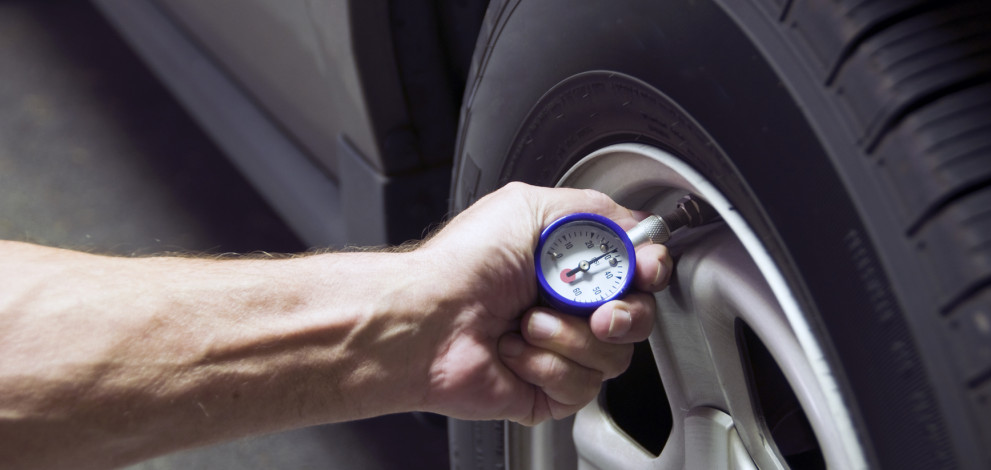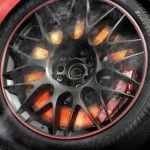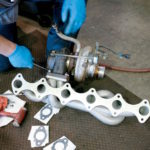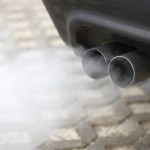Many dealerships and mechanics advise that inflating your tires with nitrogen will improve your handling, fuel economy and wheel life.
And we want to believe them.
After all, nitrogen is what’s inside of racecar tires and airplane tires.
But will nitrogen really make a difference to the everyday driver?
THE DIFFERENCE BETWEEN AIR & NITROGEN

Air is kind of a big deal. But in reference to your tires, it has its problems.
Air contracts and expands based on the temperature. And this will change your tire pressure.
Roughly speaking, for every 10 degrees Celsius change in temperature, your tire pressure will change by 1 PSI.
And this is why we’re advised to check our tire pressure.. regularly.
So what’s the deal with nitrogen?
Well, ordinary air is made up of 78% nitrogen.
And according to some experts, if you fill your tires with 100% nitrogen, you will reap in a ton of benefits, like more consistent tire pressure, an improved fuel economy, cooler running temperatures, and a longer life for your wheels.
But let’s take a closer look into each of these claims.
MORE CONSISTENT TIRE PRESSURE

What’s the claim?
Tire pressure is incrementally lost over time.
And when the temperature changes, this loss is accelerated.
Because pure nitrogen has larger molecules compared to oxygen, it is considered to have a more stable pressure.
Put differently, nitrogen is not as easily affected from changes in the temperature. And this allows tire pressure to fluctuate less.
It’s simply harder for the larger nitrogen molecules to exit through the tire’s permeable texture.
Is it true?
It is confirmed that nitrogen-filled tires experience less pressure loss compared to air-filled tires.
But by the smallest of margins.
A 2006 study recorded the loss of pressure in 31 pairs of tires over the course of 1 year.
All tires had an initial pressure of 30 PSI.
Air-filled tires lost an average of 3.5 PSI of pressure after 12 months.
And nitrogen-filled tires lost an average of 2.2 PSI of pressure after 12 months.
Is the measly difference of 1.3 PSI worth the cost of filling with nitrogen?
Probably not.
IMPROVEMENTS IN FUEL ECONOMY

What’s the claim?
Your vehicle is not operating at an optimal fuel economy when your tires are under or over-inflated.
The rule is that for every 1 PSI drop in pressure across all of your tires, your fuel economy goes down by 0.3%.
And logically, since nitrogen-filled tires will lose less pressure over time, they will also ensure your fuel economy does not suffer as much.
This is because the probability that you’re driving at the optimal PSI is higher.
Is it true?
Both air-filled tires and nitrogen-filled tires will lose pressure.
So you should be checking tire pressure regularly, regardless of what’s inside of your tires.
And if you already do so, you won’t feel any improvement in your fuel economy when making a switch to nitrogen.
But if you’re like most people, you probably forget to check.
Even vehicles equipped with a tire pressure monitoring system suffer from incorrect tire pressure (43% to be exact). Unfortunately the system will only signal if your tires are extremely under-inflated, instead of displaying an optimal tire pressure.
So is the 0.7% improvement in fuel economy worth the cost of filling with nitrogen?
The decision is yours to make.
COOLER RUNNING TEMPERATURES

What’s the claim?
The pressurized air inside of any gas station air storage tank condenses into a liquid. And when you’re filling your tires, this liquid, or water, enters the tires along with the compressed air.
When you start driving, your tires heat up. And the heat they emit expands the liquid into its gas form. And this increases your tire pressure.
By filling up with nitrogen, a much dried gas, you will keep any liquids from entering your tires. And you will avoid this pressure fluctuation.
Is it true?
Yes.. and no.
Yes, nitrogen is a drier gas.
But the pressure fluctuations and changes in temperature between air-filled tires and nitrogen-filled tires are completely insignificant.
So are these cooler running temps worth the cost of filling with nitrogen?
Nope.
LONGER WHEEL LIFE

What’s the claim?
Water that condenses inside of air-filled tires can lead to wheel rot.
And since you’re avoiding this water when filling up with nitrogen, your wheels won’t rust.
And they will live long and prosper.
Is it true?
Wheel rot is not really an issue, anymore.
Today’s alloy wheels are available with special a coat which prevents aluminum oxide from forming.
But even if aluminum oxide forms, it will serve to protect the aluminum from additional corrosion from water.
The only cause for concern is if your aluminum wheels are coming into contact with steel. An example of this is the steel spring clip that’s used on wheel weights.
If your paint is damaged, and if you add salt to the equation, you may start to see rust.
But that’s a lot of ifs.
And this problem can occur even if you filled your tires with nitrogen.
So will filling with nitrogen give your wheels a longer life?
No. It really won’t make a difference.
SO WHAT’S OUR VERDICT?

Filling up with nitrogen is expensive.
And the benefits are dubious, at best.
Yeah, it sounds appealing if it means skipping the tire pressure check.
But that check is part of your responsibility as a car owner.
So why are commercial and work truck fleets filling up with nitrogen?
The answer is simple: scale.
The advantage of being sure that all of the tires in a fleet have the correct PSI guarantees consistent fuel economy. And in the case of large trucks, fuel economy is a big deal.
It’s also tedious to check and correct tire pressure across the fleet.
So does nitrogen offer any advantages to the everyday driver?
We think your money would be better spent on a high quality air compressor or tire pressure gauge.
Do you agree?








